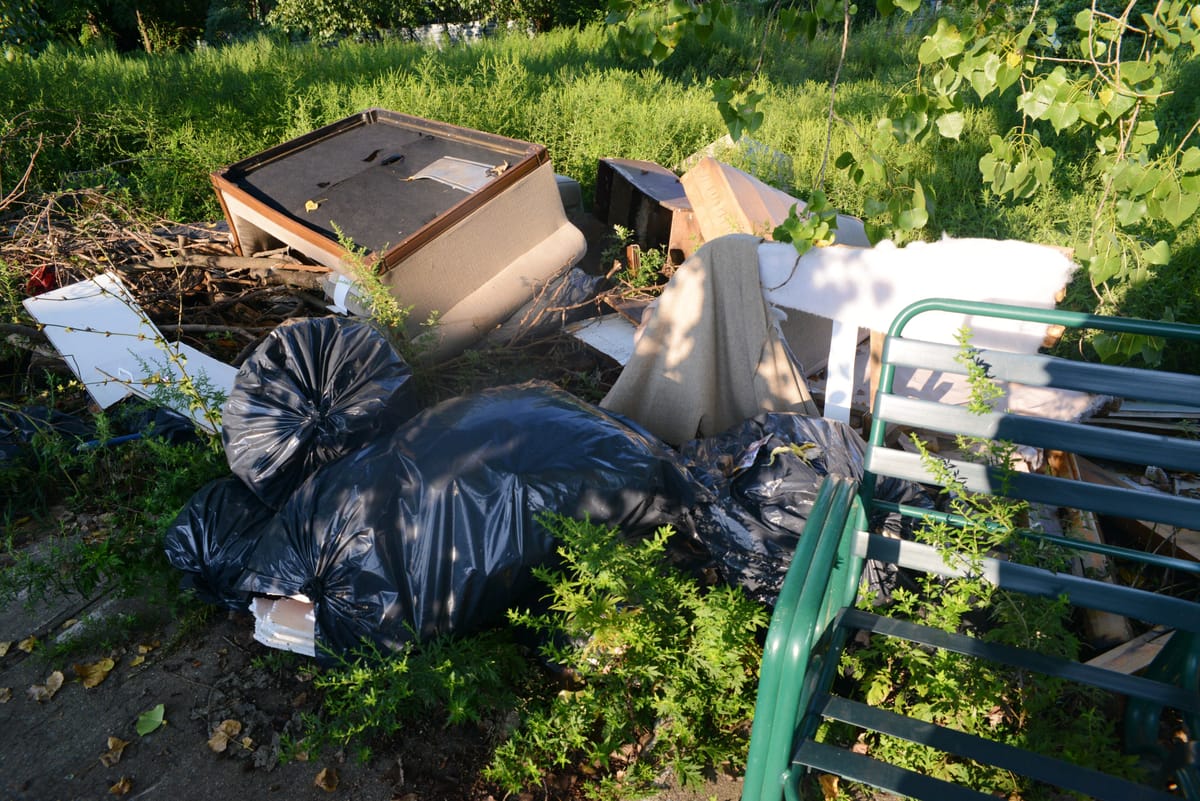Cameras Capture Illegal Dumping as Sanitation Tries to Clean Up Increasingly Dirty City
The cameras are one part of a new effort to stem illegal dumping and other trash issues, which have seen an uptick around the city since the COVID-19 pandemic, reports Katie Honan for THE CITY.


By Katie Honan, THE CITY. This article was originally published by THE CITY
The driver of a U-Haul truck recently pulled up to a dead-end block in East New York, Brooklyn, unloaded hunks of a cut tree — including branches and the chopped-up stump — and drove away.
He didn’t know that Department of Sanitation enforcement officers and the agency’s police force had recently installed a hidden camera nearby to catch illegal garbage dumpers. After observing him in the act, sanitation cops found the suspect a few blocks away and issued a summons that ran thousands of dollars.
The cameras are one part of a new effort to stem illegal dumping and other trash issues, which have seen an uptick around the city since the COVID-19 pandemic, according to Frank Esposito, the chief of enforcement for the department.
“It’s a direct impact on the quality-of-life of New York City,” Esposito told THE CITY.

The hardest hit neighborhood is East New York, which was selected as the first site of a two-week pilot program focused on improving street cleanliness.
The area has some empty lots and dead-end streets that are enticing to people who want to get rid of trash on the cheap. Esposito guessed that some of the garbage came from construction crews who didn’t want to pay for a dumpster, or from other business owners who didn’t renew their private carting certificates during the pandemic and had to take care of their own trash.
“We want to get out to folks who are illegally dumping that they’re going to be met with severe and swift penalties,” Esposito said.
Complaints to the city’s 311 system about dirty conditions, which including everything from street litter to derelict cars, were down in 2020 compared to the year before, city data shows. There were 27,835 complaints in 2020, compared to 28,711 in 2019.
But so far in 2021, there have been 27,631 complaints — putting the city on pace for a dirtier year than the previous two.
Complaints about improper disposal, which includes illegal dumping, jumped to 3,770 last year, compared to 2,814 in 2019. So far in 2021, some 2,316 complaints have been filed, according to city data.
‘Praise God!’
The Sanitation Department launched an anti-rubbish blitz the last week of July, doubling cleaning trucks sent out weekly from six to 12 and stationing undercover officers on 12-hour tours to monitor locations notorious for illegal dumping.
Throughout the two-week enforcement period, the department issued more than 2,000 summonses focused on cleanliness, with the most given for alternate-side parking violations, according to city data.
Sanitation enforcement officers handed out 24 summonses for illegal dumping, with the penalties ranging from $4,000 to $18,000 for trash dumped from a vehicle. The vehicle is also impounded, if the suspect is caught.
The surveillance — employing cameras in five high-trash areas — yielded 53 summonses, and led to one arrest of someone who had an outstanding warrant, according to the sanitation department.
During the enforcement efforts, crews picked up everything from a broken piano to a 55-gallon drum filled with cooking oil, which required help from the city Department of Environmental to remove, according to Stephen Harbin, the chief of cleaning operations for the sanitation department.
The department’s enforcement campaign is hitting the South Bronx next, and other neighborhoods in the coming months.
Ysanne Latchman, who lives in East New York, declared, “Praise God!” when told about the cleanup program.
She first saw a large pile of garbage on Dumont Avenue near Pine Street last March, once she started taking the bus again to her hospitality job.
“It got to the point where it was literally months and it just got bigger, bigger, bigger, bigger,” she said.
It took multiple calls to 311 and her tweeting photos of the giant trash heap before it was cleaned up, she said. But slowly, junk mounted again, and now includes a shopping cart.
“They have to be arrested, fined, something,” she said of those who repeatedly dump trash.
‘We’re Waiting for You’
The success of clearing up a trouble spot often feels short-lived. Harbin, who also lives in East New York, said it requires constant monitoring.
“When we picked them up, a few days later, they’re right back,” he said.
On a recent weekday, days after the enforcement blitz ended, THE CITY accompanied sanitation cops who found a fish tank filled with gravel and water, but no fish — and an abandoned green bus with weeds growing around it. A torn-up couch and some chairs were discovered around the corner.
Sanitation officials hope increased collection and more enforcement of the rules can help clean up the city’s streets. The department is currently hiring 15 more sanitation officers to help catch trash scofflaws, Esposito said.
Officials also hope more education of the public on where and how to dispose of particular waste, like electronics, can help tamp down trash. Being aware of hefty fines can also remind people of the consequences.
“Human nature is, if I can get away with doing something wrong and no one says anything, I’m going to keep doing it,” Harbin said.
“The next time that you think of dropping off, we may be waiting for you.”
THE CITY is an independent, nonprofit news outlet dedicated to hard-hitting reporting that serves the people of New York.




